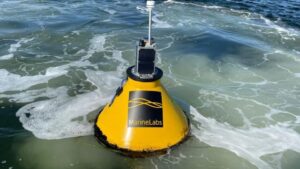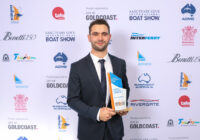By Jean-Michel Gaignè, CMM – GMBA
Monitoring, recording, tracking. Then processing, data analyzing, even driving artificial intelligence… The more information we collect, the more efficient we can be!

Not so long ago, the marina industry was still in the Middle Ages and many marina operators were using a marina management software application like a simple spreadsheet. To list the boat names and characteristics associated with owner’s contact details and to charge the marina fees were the only functionalities commonly used. Thus, any refined analysis was impossible and statistics necessarily empirical. I remember a discussion that I had with the harbor master of a commercial port, about ten years ago. The Port Authority was able to report about the list of cargo ships that called over the year, with any detail of freight loaded and unloaded, while the marina manager in the same town was just able to give the number of yachts having a permanent berthing contract, and the number of visiting boats received with their approximative origin… In France, I have heard many times such a sentence: “The boats berthed in the marinas don’t sail more than 7 days a year!” And I have always replied what is the only possible answer: “This is stupid, no one has statistics about it, it differs from one location to another one, and you could say 10 days or 30 days that it won’t be more convincing. Absolutely no one knows!”
Marinas must make the leap to become responsive
Hence, how to convince an investor or a public authority to improve an existing facility or to develop a new marina if you don’t have any proven arguments, just rough approximation, and gut feelings? The result is that many decisions have been taken according to biased studies and political interests. Of course, until recently, there were few technical devices available to help decision makers to fine tune their strategies and to confirm their choice, but nowadays it should be unacceptable anymore to deal without such assistance. Of course, for a marina with a lock and access constraints, it was easy to register the boat movements, but this is not the general case. The boat owners themselves were reluctant, and sometimes still are, to give any personal detail and to know that a third party could have an eye on their boating habits. But the lack of information is finally negative for the marina operator, the yachtsman, and the public landowner.
Sensors give us the arms of Vishnu to control marina operations!
Fortunately, many technological tools are now at our disposal, leaving these times behind and giving us a precious help. I pass over the CRM functionalities of most management applications that allow the customers to upload documents, access to a private and secure space, pay bills and exchange with the marina operator. Most important are the wireless sensors and the smart meters that send real-time information to both the management and the berth holder. It is of particular interest for the boat owner to know that something is going wrong aboard, that a fire risk is detected, that the battery level is very low and will hinder to start the engine when coming for a day out, or that there is water in the bilge… This is equally significant for the marina operator to be able to prevent any fire from starting and possibly expanding to other yachts, or to avoid the risk of a boat sinking in the marina, causing pollution.
The wireless presence sensors allocated to each berth, the RFID chips put on the boats, the smart motion silhouette detection cameras situated at the marina entrance, even the floating or flying drones are all key allies to monitor real-time occupancy of a basin and to optimize the berthing management. Thus, a boat which is obviously used twice a year for a few weeks might receive a combined proposal of dry stack and temporary wet berth, and it becomes easy to know with accuracy how the resident yachts are used. The individual water and electricity metering is a good way to empower the boat owners, while it gives opportunities to save energy and resources.
French companies like Falco (Wattson Elements), also based in the U.S, or NGE Connect, Monthabor, Sense4Boat in Croatia, Marina Master in Slovenia, SaMMY in Greece with its pilot project deployed in Patras, are good but non exhaustive examples of what can already be provided to marina operators.
In a nutshell, there is no reason today for not having all the relevant statistics available to the marina operator except for unwillingness or a backward-looking attitude. Age distribution of the berth holders, home origin, frequency of yacht uses per day, month and year, comprehensive review of the boats condition, energy, and water consumption and so on. By cross-referencing all these data, everybody wins:
The boat owner who is notified if something happens on board can save money on its insurance policy, due to increased safety precautions, and can benefit from a tailor-made offer from his home marina. The management company which has the perfect knowledge of all operations can better serve the customers while maximizing profits. Our planet, eventually, with a better use of energy and freshwater, and little pollution hazard.
And what about climate change?
This is another field in which the so-called smart marinas face a big challenge, and the prehistoric ones too: climate change and sea levels rising. Everybody knows that this is a threat for our infrastructure, even for the population, and that existing facilities will have to be adapted accordingly. The weather forecast state agencies and the most serious studies give us are predictions with a first estimation foreseeing a rise of about 20 cm in 2050. Geographical institutes have published maps showing the coast erosion according to the topography and the shoreline profile, using the Bruun Rule among other things. The marinas should be concerned in the first instance, but very few seem to have acted yet.
Indeed, it seems to be of utmost importance to consider the side effects on the weather conditions and to monitor them. In 2010, the cyclone Xynthia hit the south-west of France with battering waves, floodings and wind gusts around 100 knots. Even in the most affected areas, differences in the impacts were noticed. According to the exposure to wind, to the tidal range, to the currents, to the degree of protection provided by the sea walls, to the fetch, to a possible Venturi effect through a natural corridor… the consequences can differ greatly. Therefore, accurate data collected in each single marina should be the rule. Sensors to record the sea level and temperature, the atmospheric pressure, the wind force and direction, the tide conditions, the water quality, and chemistry would be advisable in each marina. The MarineLabs company, based in Canada, has started to deploy a network of such smart buoys, geared with various sensors. Within a couple of years, I am convinced that the data collected will provide crucial information to each port authority, to decide the relevant adaptation strategy to deal with climate change.
If the boat owner’s privacy is guaranteed and the data efficiently processed, there’s no reason to be cautious towards monitoring technology. Marinas must invest rapidly if they want to meet the customers’ expectations of today and the challenges of tomorrow!
Jean-Michel Gaignè, CMM
Jean-Michel Gaigné is a long time expert in the yachting sphere and has an extensive knowledge of the European and international marina industry. His career started 40 years ago as organizer of the famous Tour de France à la Voile sailing event after which he changed tack to become the Communications Manager of a worldwide nautical company. He has been developing marina facilities since the early 1990’s.

A prominent representative of the French marina industry, Jean-Michel is a member of the ICOMIA Marinas Group, Chairman of TransEurope Marinas, Member of the advisory board of Global Marina Institute and member of The Yacht Harbour Association Council. Prior to joining GMBA, Jean-Michel was part of the management of Saint-Quay Port d’Armor, a 1000+ berth marina in Brittany, France. He now acts as a marketing, development and innovation consultant for marinas, marine tourism, cruise ships and waterside activities.
Jean-Michel is based in France. Those wishing to contact Jean-Michel can do so on + 33 682 112 524 or email at
Those wishing to contact GMBA in Australia can do so through MaryAnne Edwards or call +61 412 916 036
Global Marine Business Advisors and its associated website www.gmba.blue are not registered legal entities. GMBA is a network of independent marine industry advisors.









